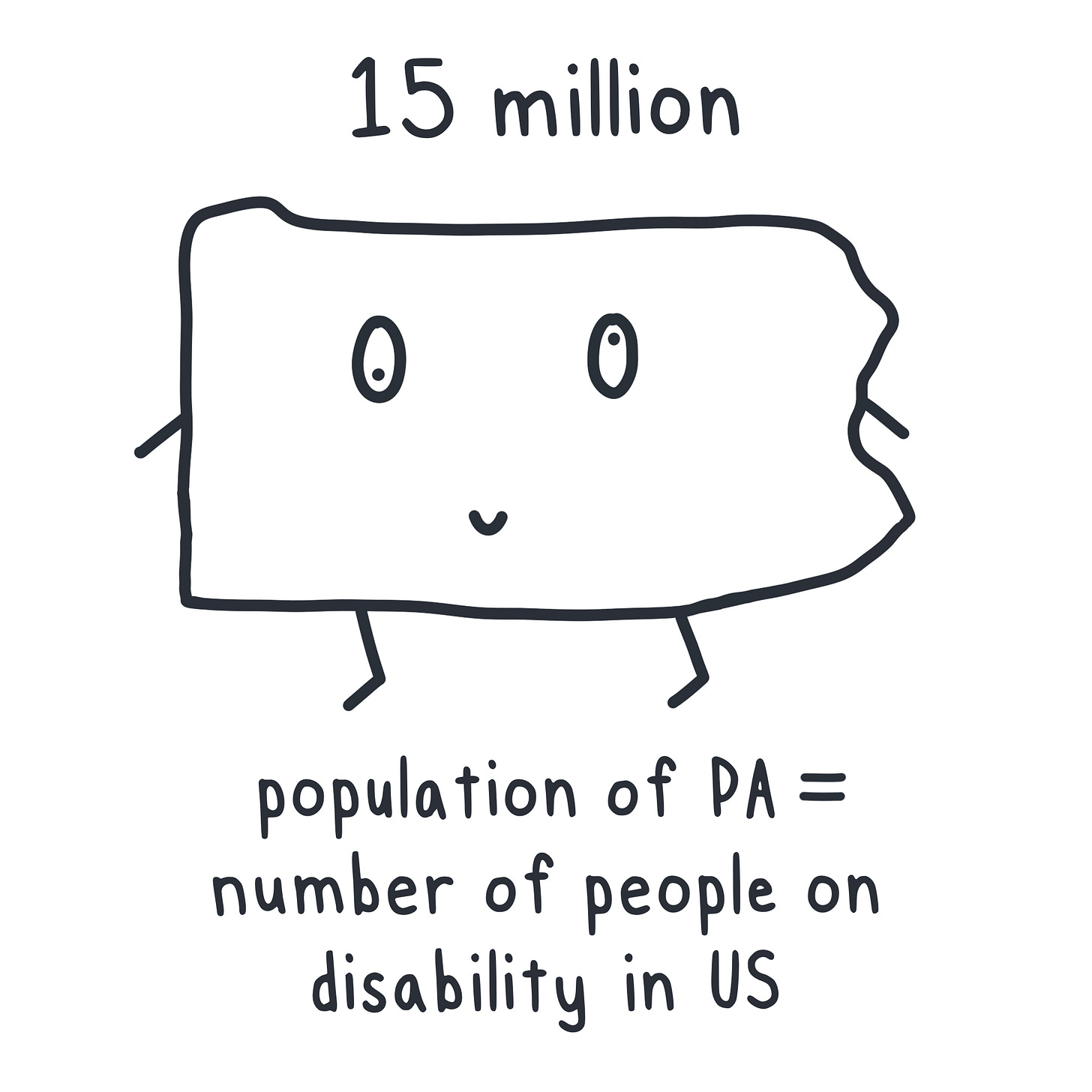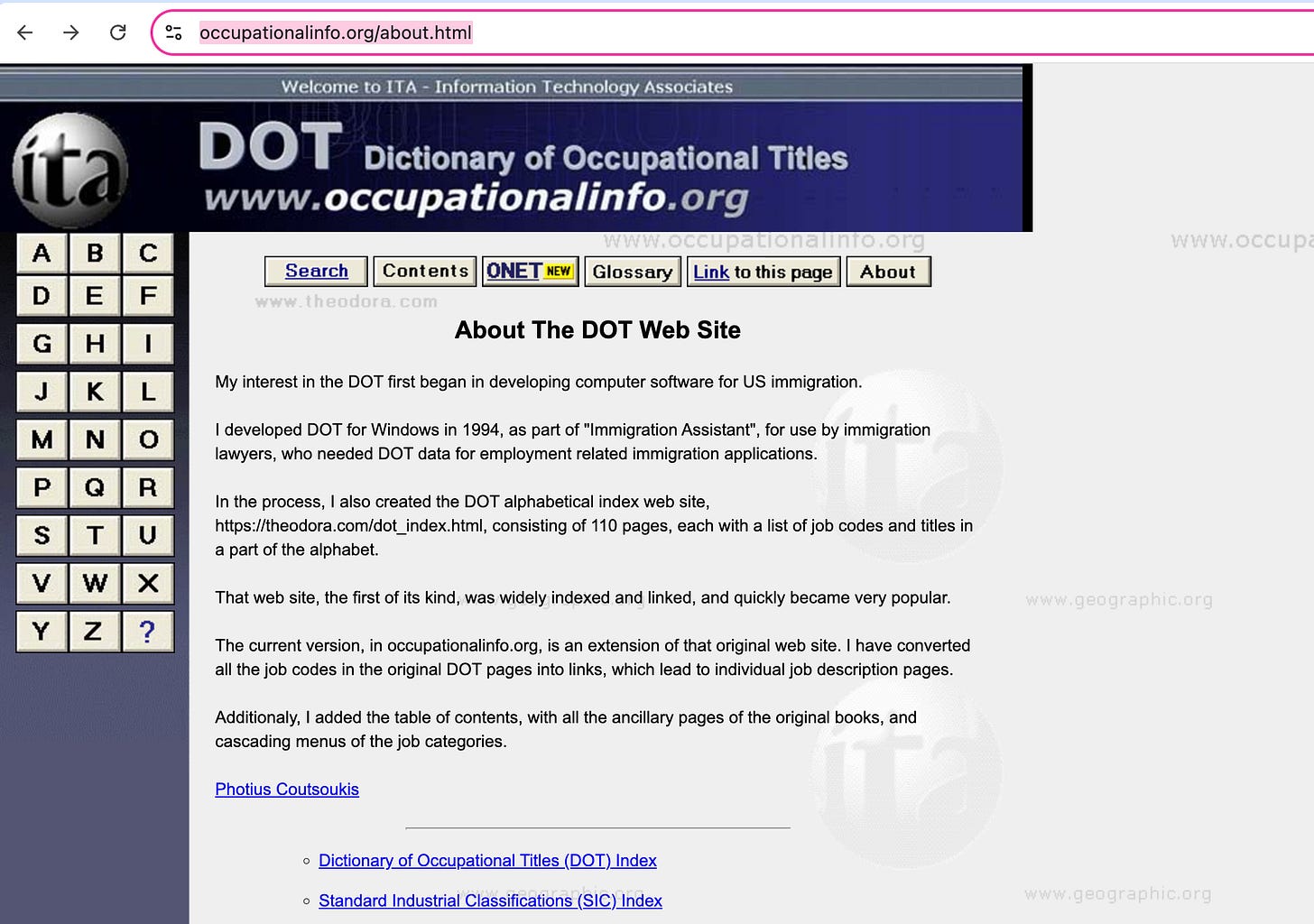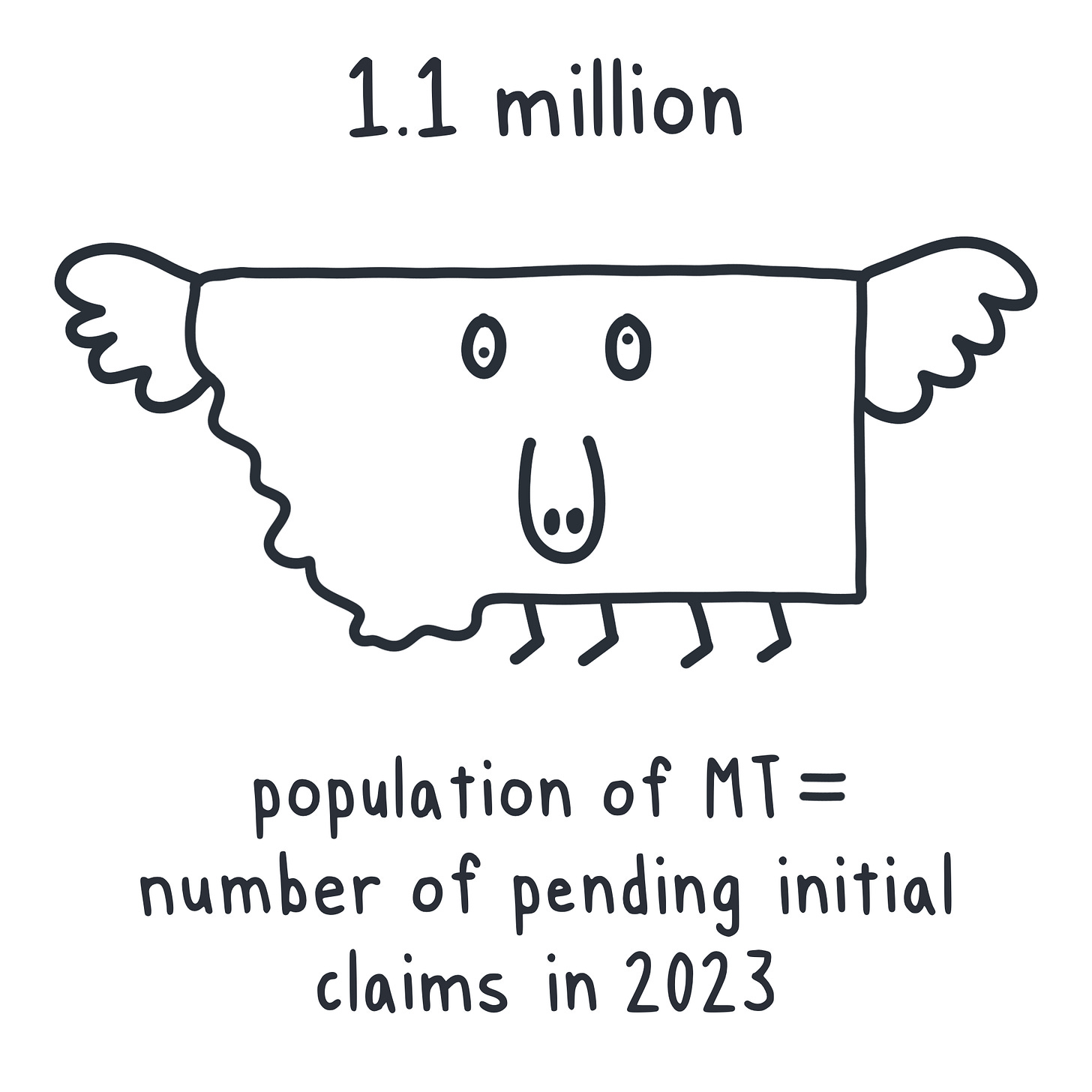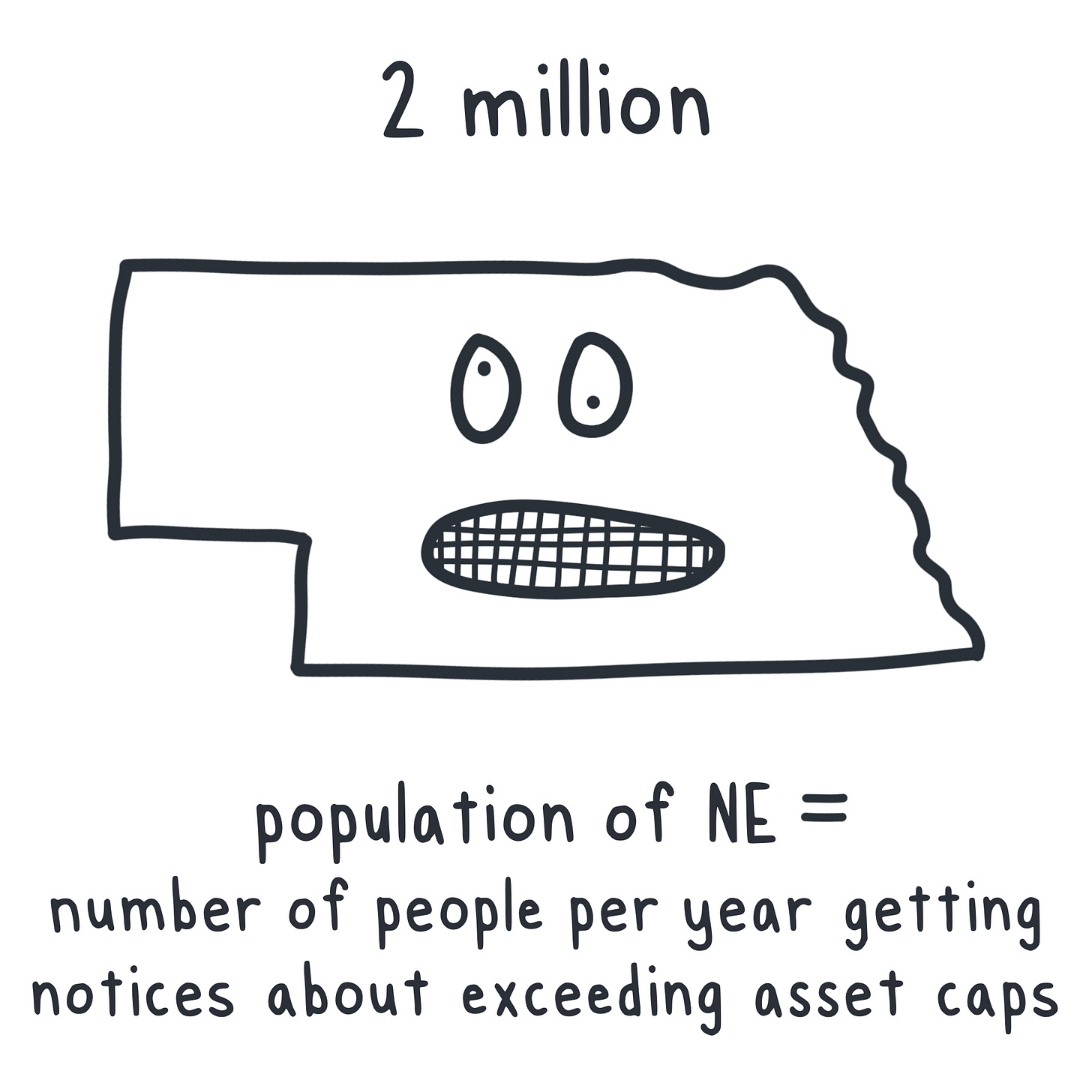literally *no one* is getting rich on disability.
John Oliver and I explain exactly why.
Do you ever feel fundamentally misunderstood about an experience you have that others don’t? I suspect we all have our thing.
About a month ago, I cuddled up in bed on a Monday night and waited for John Oliver to announce the topic of his episode which happened to me MY THING: disability benefits.
My gripe about this could be summarized as such: People think being on disability means I’m getting easy money and living a life of luxury. Even the people who know better don’t always understand how disability benefits work. I’m not here primarily to dispel that rumor but as we get into how they really work, that’s going to be an unavoidable side effect.
Here is my easy to skim summary of John’s episode in half that time complete with statistics, pull quotes, and even a few added graphics by me.
P.S. If you are lucky, disability benefits are not your thing. But 25% of 20 somethings become disabled before they reach retirement ages so chances are good that you or someone in your life may need this information at some point. In fact, I had a college student friend contact me this week asking for some help because their partner was denied disability benefits and wanted help figuring out what to do next. I hope these posts prove helpful to those who need this information most.
How many people get disability benefits?
About 15 million people rely on Social Security disability benefits. That’s more than the entire population of Pennsylvania. Benefits provide for basic needs such as food and shelter as well as access to health insurance in the form of Medicare or Medicaid. About 25% of Americans (95 million) have some type of disability.
What is SSDI vs SSI? Are they the same thing?
There are two ways to qualify for the dollars but the programs have similar acronyms which are notoriously confusing.
SSDI (Social Security Disability Insurance) is a program that all working people pay into. If you become disabled and have enough “work credits” in the system, you can apply. This is the program I qualified for. The amount you are paid monthly is roughly dependent on your earned income during those years.
SSI (Supplemental Security Income) is a safety net style program that provides supplemental income to disabled people with no work history. However, it has strict asset caps—more on those later—they are much lower than you would think. Note the use of the word supplemental here: it’s not enough money to live on, just a supplement.
Is it easy to get these benefits?
No, unfortunately not. Most who apply for benefits get denied. Read that carefully. Most means *more than half* get denied. Just because you are disabled doesn’t mean you will qualify for benefits.
That’s just the beginning of the problems here because these benefits can be hard to get, easy to lose, and turn your life upside down.
—John Oliver “Disability Benefits: Last Week Tonight” on 9/26/24
How long does it take to get benefits?
Never in weeks. Rarely in months. Almost always in years. If your application isn’t approved in round one, the next step is reconsideration and then most likely, an appeal in front of an administrative law judge. At some point, you can be asked to see disability-appointed doctors for an evaluation. Each step has it’s own separate timeline.
I applied for my benefits in August 2019 and saw my first benefits appear in my bank account in November 2022. Especially considering this was during COVID, that’s not actually too bad. Although I did receive backpay for most of that time, applying for disability is not a quick fix to anyone’s sudden inability to work
And those long waits are not benign: over 48,000 people filed for bankruptcy while waiting on their appeals from 2014-2019. Nearly 30,000 people, died waiting for a benefit decision last year, according to the guy in charge: Martin O’Malley, Social Security Commissioner. (I cannot stress how much I appreciate a political appointee being an unknown “some guy.” Sorry, Martin.)
People have waited as long as eight years caught up in appeals, though thankfully, that is the exception. As John Oliver put it, “If you can say I applied for benefits when Harambe was alive and still not have them, the system is moving too slow.”
How do they determine if someone is disabled enough to qualify?
While a personal physician is able to submit paperwork about their observations, often the doctors making the determination haven’t seen the patient but once or in extreme cases, even at all. Someone who has simply reviewed your record once can override your doctor even if you have an a clearcut diagnosis on their fancy list of impairments.
Like me, if you have a condition that isn’t on their list like MECFS, you’ll have to cobble together very specific evidence from each of the impairments on the list, something that not everyone is equipped to do successfully. Fail to meet their threshold? Denied.
And the person reviewing the paperwork may not be spending much time doing so. It can be lucrative gig for doctors in some states. A 2019 Tennessee report revealed that doctors are often paid per case with one doctor making $420,000 by reviewing 9,088 cases. He spent just 12 minutes per case. You will spend more time reading this piece now than than that guy spends reading someone’s entire medical history.
Wait, people with clearcut disabilities really don’t get approved?
No. In some cases, serious illnesses are denied. John highlighted one story about a 4-year-old girl with cerebral palsy. Although the interview of the little girl clearly shows very obvious gait and hand function disabilities, the doctor hired by Social Security said they were both normal. They also said her reading and writing skills were unimpaired but her mother said she was never tested for either the day of her evaluation. She was denied benefits multiple times that she needs for therapies which leaves her parents paying out of pocket. This is not uncommon.
But surely they are keeping up with modern medical standards?
Also no. For example: one important eligibility criteria for kids with sickle cell disease is to prove that they are anemic. Guess what happens when a kiddo is being treated with medication? Their anemia goes away. Kids “would be almost getting punished for having the modern medical treatment” according to Dr. Lewis Hu, a pediatric blood disorder specialist. Recent changes in criteria (an estimated 15-20 years behind current science) suddenly made many children ineligible for equally shocking reasons: they weren’t being hospitalized enough to qualify.
"If I'm working to do my best as a doctor, I am trying to keep kids out of the hospitals or trying to shorten their hospital stays," Hsu said. "And then I find out by doing that I have made them ineligible for [disability benefits].”
—Dr. Lewis Hu, specialist and chief operating officer of Sickle Cell Disease Association of America
Can’t disabled people just do different kinds of work than before?
Yes, potentially. In some ways, this is a good thing: someone can’t just get disability for being unable to work their old job. If they can do other work, Social Security expects them to pivot and change careers.
However, the list of occupations they evaluate suitability for hasn’t been significantly updated since 1977. Would you like to be denied benefits because someone says you are theoretically capable of working antiquated jobs such as dowel inspector, nut sorter, or magnetic tape winder?
These tasks are detailed in the Dictionary of Occupational Titles website. I cannot stress enough how the site looks like (as John puts it) the first website ever made:
So how did you get approved?
I got lucky.
Like many other applicants, I hired an attorney. (Without getting into the weeds, there are rules around how much money they can make and typically, they take a portion of your backpay rather than requiring a retainer or hourly rate.) Most lawyers refused to take my case because it is so much more difficult to win a case when the patient is under 40. I was 35 at the time of application.
I also got lucky that the administrative law judge who conducted my hearing was on the more generous side of things. The percentage of cases individual judges approve varies from 9% to 96%.
Some don’t get lucky like I did. Those that lose on appeal can head to federal district court to argue that Social Security made a mistake. One man won his case at that level because the original decision was based on someone else’s medical records: no one at Social Security noticed. “We see mistakes like this that happen all the time” said Annette Rutowski, an attorney.
The federal government will order Social Security to pay your lawyer fees if they are at fault. No system is perfect but it’s paid over $390 million over the last decade which isn’t great.
Why is it all so fucked up?
Budget is a huge factor. It was slashed dramatically in 2011 and never fully recovered. The number of applicants is higher than ever and the resources available to evaluate cases is going down. The number of pending initial claims last year is over 1.1 million. When you think about the number of lives this affecting, it’s heartbreaking.
But aren’t disability benefits as close to a free paycheck as you can get? Why complain so much?
Listen, I’m not saying I’m not grateful: but I am asking you to allow me to explain exactly why disabled people get trapped in a cycle of poverty:
How much money do people get paid on disabilty?
Most people on disability aren’t even getting enough money to cover rent in most US cities. The current SSDI monthly check averages $1538, which is approximately what I receive. The current SSI monthly check is maxed at $934 for single people.
That’s before any Medicare premiums or Part D pharmacy premiums, so for most people the number is even smaller. I pay the standard rate of $174.70 each month for Medicare benefits though the cost varies both up and down based on income and whether you qualify for savings programs. My Part D plan is another $100 on top of that.
But once you get benefits, it’s not that easy to lose them, right?
Yes it is. Remember how I said we’d come back to those asset caps for SSI? if you are on SSI, you may own your home, car, and all other assets are capped at $2,000.
An inheritance or a GoFundMe could put someone over the asset cap meaning many people who are disabled aren’t able to accept financial help either. John featured a story about people whose benefits were stopped because the COVID stimulus check from the government itself put them over the asset cap. I know, right?
Why the $2,000 asset cap?
It was established decades ago and would be $10,000 today had it been linked to inflation—which it absolutely should be!
The asset caps makes it functionally impossible to save money, considering that a trip to get the car worked on would effectively wipe out their savings.
Most vans cost more than $2000, especially if you want one where the engine is still running or you’re gonna plan on pushing it like Fred Flintstone.
—Patrice Jenner, SSI beneficiary
But how do disabled people buy food, gas, and pay their bills?
Many would love to work part time or do odd jobs to make up for the fact that they cannot live on $11,316 per year. But there are non-negotiable caps on what you can earn ($1350 per month in 2022) and if you go over, you can lose your benefits entirely. And in some cases, you must pay benefits back.
I started working with a writing mentor this fall and during our first chat, we spent 75% of our time together talking about carefully we have to protect my benefits while opening up an avenue to earn money from writing. I would be thrilled to get off disability benefits. I’m currently exploring the ticket to work program that helps disabled people to transition back to working.
But if I misstep and earn too much money one month before that happens, I could lose them. Even if I reapplied, it would not be easy to get them back: I would no longer have work credits to qualify for SSDI and I have more than $2000 in assets so I would be denied SSI as well.
But they don’t actually enforce that, do they?
Unlike jaywalking or speeding 3mph over the limit, they actually do. Over 2 million people per year get notices about exceeding asset caps per year: tax dollars are being spent to enforce rules ensuring the poorest people remain as poor as possible.
“If you want to get rich quick, disability benefits is the worst possible way to do that...It is no wonder that so many who rely on these benefits feel trapped in cycle of poverty. In 2016, over half of all beneficiaries had incomes below the federal poverty line even with their SSI benefits.”
—John Oliver “Disability Benefits: Last Week Tonight” on 9/26/24
But wait, there’s more: the marriage penalty!
Let’s say someone on SSI wants to get married. The disabled partner will lose benefits if the married couple’s assets are over $3,000. Some disabled people never marry because they would lose access to their health insurance, medical equipment, and caregivers.
For those who require caregivers to help with tasks like bathing and dressing, the loss of Medicaid benefits aren’t just a matter of switching to your partner’s health insurance. I don’t know about you, but I don’t know many people in the dating pool who are able to afford to pay their partner’s $100,000+ out of pocket medical expenses once they get married. In practice, the right to get married doesn’t extent to disabled people.
But, Jess, what about those people who are on disability and taking advantage of the system?
Fraud is unethical whether it pertains to lying to get disability benefits, insider trading, or cutting cocaine with cornstarch. (Sorry, I really pivoted there for a minute.)
Unethical behavior is a human problem. Disabled people are not more unethical than any other groups of people. Personally, I’m much more concerned about the honest disabled people who are dying or going bankrupt before getting their benefits that the small number of people who commit fraud. You should be too, now that you know what a real problem that really is.
It’s impossible to know how many people on disability are on the books due to fraud. Frankly, given how the system works, I’m impressed anyone is able to accomplish that successfully.
The aggressiveness with which people want to police the disabled is suspicious. I expect able-bodied people don’t want to admit that they fantasize about the idea of not having to work and get “free money.” But they don’t want to spend equal time considering what the reality of life for a disabled person is: painful, frustrating, stressful, isolating, and more often than not: spent in poverty.
I used to work. I get it. Working really sucks. But the grass is certainly not greener over here and the disabled certainly don’t feel like fielding the bulk of your frustration. Having money to pay rent covered while being forbidden from earning enough to cover other basic expenses is not living large.
I’ll be the first to admit that binge watching Love is Blind on a rainy day instead of having to get up and deal with idiot coworkers is nice sometimes. But there is no universe in which I would trade this life for that one.
The obsession with disability fraud reeks of ableism and if you are among that group (as I once was myself), I’ll very gently encourage you to sit with that for a few minutes.
What can we do to fix this?
According to John Oliver, the to do list looks like this:
switch to universal health care (unlikely anytime soon)
fund Social Security Administration properly
give more weight to an applicant’s personal doctors
update the job lists to the 21st century
The goods news is that there are two bills in Congress right now: the SSI Savings Penalty Elimination Act (Senate) and the Supplemental Security Income Restoration Act (House). Both would raise the asset limit and crucially, tie it to inflation. The latter would raise benefits and increase the amount of additional income beneficiaries could earn. Both bills have been introduced but have not moved farther yet. If you were so inclined, each bill has a link to contact your member of Congress.
Although it’s a bit too extreme for most, I might add that there is a decent case for universal basic income being an effective strategy for addressing many of the issues in the current disability benefit system.
But until any of these changes happen, this is the system we have. It’s not perfect but it’s better than nothing. It’s a system that we need to ensure that all Americans are able to have their basic needs met: I promise you, that’s all any of us want for ourselves and each other.
Did this post teach you something new? A heart is most appreciated, it helps my posts find the readers who can most benefit from this content. Even with John Oliver’s statistical help, this post took approximately 13 hours to prepare and package up for you. While cathartic, it’s a labor of love.
Sources:
https://www.youtube.com/watch?v=hq2s7RMRsgs
https://www.newsweek.com/nearly-30000-americans-died-waiting-social-security-benefit-decision-1955401
https://www.ssa.gov/oact/cola/SSI.html
https://www.ssa.gov/policy/docs/statcomps/di_asr/index.html
https://www.cbsnews.com/news/sickle-cell-disease-children-social-security-ssi-disability/
https://www.ssa.gov/oact/NOTES/ran6/an2020-6.pdf
https://www.cdc.gov/ncbddd/disabilityandhealth/infographic-disability-impacts-all.html
I make an effort to ensure all the informative above has been fact checked. If you notice anything that isn’t accurate, feel free to send me a DM in Substack.








Thanks for listing sources. Though it's depressing as hell, a visual for # of people who die or go bankrupt while waiting for benefit approval would also be a good visual. Locally, imagine the whole student population of NC State just not being alive, and that's how many folks kick the bucket waiting .
My mom's quality of life is remarkably better because of disability benefits, in no small part because continuing to work would have caused her body to decline so much more rapidly, and there's a good chance we would have already lost her by now. Thinking of it like that, and how she has been able to impact her grandkids so positively in the extra time and health she's had because of these benefits, it's clear to me that this program has the potential to have generational benefits to our country. We tend to think of this as individual benefits, but it's whole families.
I'm glad you wrote this.
Thank you for sharing this.